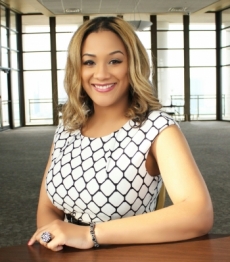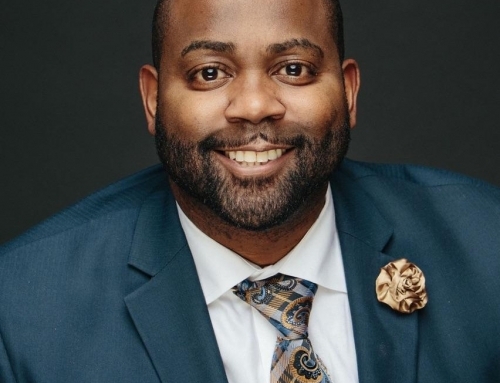 Kanya Bennett is an attorney and currently serves as Counsel to the Committee on the Judiciary of the U.S. House of Representatives, where she works to advance Federal legislation. In this capacity, she works with Members of Congress and their staffs, constituents, advocates, academics, and other interested individuals to develop and implement the Committee’s policy agenda. Prior to her work on the Committee, Ms. Bennett served as a Congressional Fellow with the Congressional Black Caucus Foundation. The fellowship allowed Ms. Bennett to serve in a Congressional office and with the Committee. She earned her BS in Journalism from the University of Illinois at Urbana Champaign and JD from the University of North Carolina at Chapel Hill School of Law.
Kanya Bennett is an attorney and currently serves as Counsel to the Committee on the Judiciary of the U.S. House of Representatives, where she works to advance Federal legislation. In this capacity, she works with Members of Congress and their staffs, constituents, advocates, academics, and other interested individuals to develop and implement the Committee’s policy agenda. Prior to her work on the Committee, Ms. Bennett served as a Congressional Fellow with the Congressional Black Caucus Foundation. The fellowship allowed Ms. Bennett to serve in a Congressional office and with the Committee. She earned her BS in Journalism from the University of Illinois at Urbana Champaign and JD from the University of North Carolina at Chapel Hill School of Law.
Ms. Bennett is a high powered legal professional in our nation’s capitol and I am thrilled that she took time out of her extremely busy schedule to discuss her career background and philosophies with me. She is the first of many leaders that I will feature to provide you with real life examples of professionals that are making exciting moves in their careers.
Q: So, tell me about your current role as Counsel to the Committee on the Judiciary of the U.S. House of Representatives. What does a “normal” day look like for you?
The Committee on the Judiciary consists of five Subcommittees that examine and advance policy pertaining to civil rights and civil liberties, criminal justice, immigration, commercial and administrative law, antitrust, intellectual property, and the judiciary. I draft legislation, organize Congressional hearings and briefings, and coordinate Committee and House consideration of bills on policy issues in a manner that is consistent with the Committee’s agenda. This agenda is shaped by our work with Members of Congress and their staffs, constituents, advocates, and other interested persons and entities.
As you can imagine, serving as Counsel to the Committee on the Judiciary provides for a varied daily experience. For example, one week, I implemented a Subcommittee hearing on a policy matter which required me to identify and secure hearing witnesses, draft a hearing memo, questions, and other materials, and prepare Member statements and briefings. Another week, I staffed Members of Congress on the House Floor during consideration of a commemorative resolution, continued drafting legislation in response to several policy concerns, and met with representatives from several organizations that wanted to make Congress aware of their policy interests.
Q: What advice would you give to someone trying to gain entry into your field?
My advice for someone looking to pursue a career in policy and politics is to utilize fellowship opportunities as they can open up a lot of professional doors. Professional fellowships are great for a couple of reasons. One, fellowships are for a defined period of time, usually one or two years, so they can be used to fully immerse yourself within a particular field in order to make an informed decision as to whether or not you want to continue that career path or pursue something else. Two, if you decide you want to continue advancing your career within that field, you are equipped to transition fairly easily into a permanent position because the fellowship will allow you to acquire the necessary skill-sets and build important relationships in that particular realm.
After law school, I was a Congressional Fellow with the Congressional Black Caucus Foundation. I knew that I wanted to use my legal education to engage in public service, but I wasn’t certain in what capacity. The fellowship provided me with the opportunity to serve in a Congressional office and immerse myself in the policy and political processes, which I found rewarding. The fellowship then allowed me to transition permanently to the House Judiciary Committee and continue my commitment to public service. There are so many entities that offer fellowships, from organizations, to universities, to government agencies. There is also nothing that says that you can’t reach out to an entity without a formal fellowship program to discuss the possibilities of creating one for you.
Q: You’ve had a very successful career as an attorney on Capitol Hill. What would you say are the ingredients for career success and upward mobility?
I believe there are three main ingredients for career success and upward mobility.
One, constantly assess and define your professional self and purpose. Every few months, regardless of where you are in your professional life – whether you’re content with your current employment situation or looking for a new job – take some time to evaluate where you are career wise. Determine how you are growing, developing, and progressing professionally and if you are at a place that is consistent with your purpose. Make sure that you are always working towards that purpose with your short term and long term career goals. For example, if you are looking for employment, even during this tough job market when opportunities are limited, pursue only those professional opportunities that are consistent with your career ambitions. Or, if you are looking for a promotion with your current employer, make sure that you’re identifying opportunities both within and outside of the office that will position you for that promotion – for example, pitching innovative responses to office assignments or joining a professional organization.
Two, you need to have a mentor and be a mentor. You should adopt a couple of individuals who are established in your field to serve as a mentor. In addition to advising on career next steps, these mentors can serve as references and even potential employers. You should also allow yourself to be adopted by a couple of professionals that are junior to you. Though demanding office schedules and other commitments may have you shy away from any mentoring responsibilities, you might be surprised to find that you can learn and grow tremendously from mentoring. I know that I have grown from the instances in which I have shared my insight as an attorney and policy professional during just a 30-minute informational interview. So, the next time a junior professional asks you for an informational interview, you should say “yes.”
And three, you need to get out there and network. We would like to think that our hard work and professional accomplishments are enough to get us recognized for the next great opportunity, but that is not the case. Relationship building is key to getting hard work and accomplishments noticed. Also, you need to let those who are in your network know exactly what you want. If you are ready to pursue a new opportunity or want someone to serve as a reference, that needs to be conveyed. You can have great relationships, resources, and contacts, but if they don’t know how they can be helpful to you, then you may find yourself stagnant professionally.
Q: I’m sure that you’ve learned many lessons throughout your career. What is something that you wish somebody had told you regarding career and professional development?
Prior to moving to Washington, DC and embarking on a legal career on Capitol Hill, I wish that someone would have told me that networking is key to career and professional development. I can’t emphasize it enough. In many cities, networking is key to building the relationships that are necessary to start and advance your career, but I think that this is especially true in Washington, DC. For those looking to establish a career in policy and politics, the applicant pool for most every position consists of individuals that are bright, talented, and have the requisite degrees. It’s the relationships that you’ve established through networking that can set you apart from the rest of the pool to get your resume to the top of the pile or a first interview.
I also want to point out that networking doesn’t have to be the formal, rigid activity that it’s often depicted as; it can be enjoyable and genuine. Take some time to truly identify your professional, as well as personal, ambitions so that you can select networking events that are consistent with those objectives. This allows you to be in environments and form relationships that are genuinely of interest to you. Also, remember that networking can occur anywhere and with anyone. So, in addition to the traditional reception, you can network at the gym. It never hurts to be the best you, particularly when the person on the treadmill next to you can help you get your next job.




Congratulations, Kanya and Khalilah. You are both very accomplished professionals. I agree with your take on the importance of both networking and mentoring. After reading the blog I plan to be more prepared to share information about my practice and professional skills at both formal and informal settings. Also, yesterday I heard similar advice about both having a mentor and being one. In addition I also think it is important to have peers who are walking the journey with you. Thanks again to the both of you.
This is an excellent series, and very inspirational. Keep up the great work, you Blogger Boss! 🙂
Great insight. I particularly like the segment about having and being a mentor. That is definitely something I can take away from this article! Thanks again!
Great work and great addition to your site. I look forward to future installments of Movers & Shakers. I am certain these installments will give everyone who reads a takeaway that they can apply to their personal areas of development and growth.
Thanks for the information Khalilah! Keep the segments comimg-they are very useful for those that want to take it to the next level. Continue to SHINE ladies!
Great piece. Kanya is inspiring.
Outstanding piece! Amazing how many of us from U of I are now based and doing well in the District of Columbia.
This is a very interesting and inspiring piece — Kanya gives good insight and is a true gold standard for professionalism. I congratulate Khalilah on featuring this type of realistic example of dynamic success. Best wishes to you both!
Congratulations Kanya. This is nice. So motivating for me! Great piece:)
Great piece! Excellent advice on networking. I look forward to more tips on becoming a high powered professional.
Great spotlight piece–wishing you cont’d success!
KB, Very motivating I will make it a point to share this with my students. I am very impressed!
Khalilah- You are doing a great job! In the world that puts more effort into keeping up with the Kardashians as opposed to keeping up with people who are changing the world, this is a very refreshing article. Thank you both for your positive contributions to this world.
This is a great piece that I will definitely share with others. It is truly motivating and I look forward to more insight from both of you.
Good stuff!
Khalilah- such a well written piece! And Miss Kanya so proud of all you do, and continue to do. Both of you are great examples of hard-working people (not just women) that everyone should be so lucky to know and learn from.
nice piece. it’s good to see other women of color who are on the move!
It’s good too read your site again, i see some interesting updates here..
Hi blog owner! I have a simple request. I was just googleing for some info on the topic you wrote and found this post. Some really cool stuff you posted here. Can I please link to this post on my new website I am currently workin on? Please:) . I will check back again later to see how you responded. Thank you, Nina Scott .
Thank you very much for the compliment! Please feel free to reference my site on your website.
Great info buddy, thanks for useful article. I’m waiting for more
I am extremely impressed with your writing skills and also with the layout on your blog. Is this a paid theme or did you customize it yourself? Either way keep up the nice quality writing, it’s rare to see a nice blog like this one these days.. 🙂
[…] 1. Mover & Shaker: Kanya Bennett […]
Now that you have a job interview, the next step is to figure out what to wear to interviews. What kind of business attire was too casual or intimidate a big difference in getting a job. Remember, dress for the job you want not the job you have.
I love your blog.
It’s very interesting and clear. I found you in google and I’ll for sure come back to check for new fresh posts. Keep blogging like this, if more people shared this kind of great information, the net would be much better
Great blog!! You should start many more. I love all the info provided. I will stay tuned 🙂
love it!
I am extremely impressed with your writing skills and also with the layout on your blog. Is this a paid theme or did you customize it yourself? Either way keep up the nice quality writing, it’s rare to see a nice blog like this one these days.. 🙂
Pretty insightfull post. Never thought that it was this effortless after all. I have spent a great deal of my time searching for someone to clarify this matter clearly and you’re the only one that ever did that. Thanks a lot! I look forward to reading more from you!
[…] Previous Mover & Shaker Features: 1. Carolou Goodridge – Image & Fashion Consultant 2. Kanya Bennett – Attorney on Capital Hill […]
Dude preserving creating the ideal content material.|Wow wonderful content, for no reason examine something quite like it. Enjoy your methods and options, many thanks repeatedly
For some reason or another, I can’t see all of this content, the text keeps disappearing? Are you utilising something crazy?
[…] Previous Mover & Shakers: 1. Kyra Kyles – Reporter, Columnist, Blogger and Broadcast Correspondent for the Chicago Tribune’s Red Eye 2. Carolou Goodridge – Image & Fashion Consultant 3. Kanya Bennett – Attorney on Capitol Hill […]
Gosh, I’ve been looking about this specific topic for about an hour, glad i found it in your website!
Thank you! I’m glad that you found the information useful! Please do come back and visit!
Thank you!!
Amazing site, where did you come up with the information in this post? I’m pleased I found it though, ill be checking back soon to see what other articles you have.
Thank you!
I am so happy to read this. This is the kind of info that needs to be given and not the random misinformation that is at the other blogs. Appreciate your sharing this beneficial content.
Yo! Is it alright that I go a bit off topic? I am trying to view your site on my iPad but it doesn’t display properly, any suggestions? Thanks for the help I hope! Deirdre
Whoa, watch out I suppose I just found my new fresh extraand trusty blog, very informative
I was reading about it somewhere I don’t recall where it was. Thank for reminding me of it.
I agree with your post absolutely and I am now interested in reading some more of your posts on your blog and see what you have to say. Do you mind if I tweet your blog post out to my followers on twitter? I think they would also enjoy the blog post. Thanks.
I’ve recently started a blog, the information you provide on this site has helped me tremendously. Thank you for all of your time & work.
You have motivated me, I have to write something about it.
I’ve looked at your website and you could really do with some backlinks to give you more traffic, its a shame to see such a good blogger with great thoughts but not enough people to tell their thoughts to.
would it be possible to translate your website into spanish because i have difficulties of speaking to english, and as there are not many pictures on your website i would like to read more of what you are writting
Nice post — thanks for sharing.
Thanks for the compliment!
Interesting thoughts here. I appreciate you taking the time to share them with us all. It’s people like you that make my day 🙂
It surely was new to me. I just wanted to thanks a lotfor plenty of educative stuff that you put in this article.
Thanks!
Hiya, I am really glad I have found this website. Nowadays bloggers write only about sport and internet and this is really annoying. A good blog with interesting content, this is what I need. Thanks for keeping this website, I will be visiting it. Do you do newsletters? Cant find it. Please check my website gry
Thank you for the compliment! I don’t currently do newsletters. But, please do come back and visit!
Thanks for the post
Thank you for visiting!
You certainly deserve a round of applause for your post and more specifically, your blog in general. Very high quality material
Hey I have a personal blog about fitness, where I document my weight loss journey. I would like to link to your article if that is allowed?
Hi! That is perfectly fine.
[…] 1. Rebecca Ortiz: Chicago B96 On-Air Radio Personality 2. Kyra Kyles: Reporter, Columnist, Blogger and Broadcast Correspondent for the Red Eye 3. Carolou Goodridge: Image & Fashion Consultant 4. Kanya Bennett – Attorney on Capitol Hill […]
I love learing from your blog keep blogging! I think? I am just fascinated.
Thank you very much!
im generally roaming throughout the web nearly all in the afternoon which means that We have a propensity to peruse a good deal, which sadly isn’t normally a beneficial choice as some from the blogs I view are constructed of useless nonsense copied from various internet pages a million times, but I have to compliment you because this blog site is in reality pretty informative and consists of a whole lot of special material, so cheers for stopping the fad of basically just copying other people’s websites, in circumstance you ever wanna have fun with several hands of zynga poker together just send me a message – you have my email address 🙂
Blogroll links aint that fantastic 😛 but i’m not the admin?:P ?Just Telling 😛 😀
I trust it is pretty cool for all? of us.
Your work can not be anymore interesting as it really kept my eyes stuck to the page. You have incredible talent and are fortunate to be born with such great ability. Looking forward to your next piece.
oh cool, this information is really useful and definately is comment worthy! hehe. I’ll see if I can try to use some of this information for my own blog. Thanks!
Hey very nice blog!! Man .. Beautiful .. Amazing .. I will bookmark your blog and take the feeds also…
Thanks lots for the post. Keep up the fantastic work. I will be returning soon.
thx for this post ! very informative !
I wanted to thank you for this worthwhileread!! I’m certainly digging every little part of it. I have you bookmarked to check out new stuff you shall post.
Hi might I use some of the insight found in this blog basically give a link to your website?
Yes, you may!
thx for this post ! very informative !
The golden rule of writing effective curriculum vitae is to write it from the employers point of view. Keeping that in mind, I have 3 killer tips that will help you to a resume that will stand out and grab the employers attention.
Here is a true site with a few useful ideas in one detailed article.
Hmmm this post is funny and interesting. Can you comment me any related articles?
Hi, great blog. I am also leading one’s and I know how hard it is. Your articles are great, although not always I agree with your opinions, but in spite of that I will visit your blog more often. I wish you the success and the perseverance in running the site, Ann
As stated above it is vital that your blogs content is updated very regularly, ideally you aim for a article, post daily.
What a great resource!
My partner and i must say, during your search via tons of blogs each week, the actual theme of your respective website is distinguishable (for the appropriate factors). Unless you mind me personally requesting, what is the brand on this theme as well as could it be the customized extramarital relationship? It really is better than the particular themes I take advantage of for most of my weblogs 😉
Has anyone tried to use Google Base to find a job? They say it can be done…
highpoweredorofessional.com is very good so far.
[…] Previous Movers & Shakers: 1. Utkarsh Bhagat: Mergers & Acquisitions Tax Associate 2. Rebecca Ortiz: Chicago B96 On-Air Radio Personality 3. Kyra Kyles: Reporter, Columnist, Blogger and Broadcast Correspondent for the Red Eye 4. Carolou Goodridge: Image & Fashion Consultant 5. Kanya Bennett – Attorney on Capitol Hill […]
Wow! Thanks for sharing that information.
I appreciate you for posting such a wonderful website. Your weblog was not only informative but also very inventive too. We find very few bloggers who can create technical articles that creatively. I keep looking for information regarding something like this. We ourselves have gone through many websites to build up on information regarding this.I will keep coming back !!
A round of applause for your article post. Really Great.
This is actually quiet similar to a blog post that I made a few days ago.
Great minds think alike
Resources this kind of as the 1 you mentioned here will be extremely helpful to myself! I will publish a hyperlink to this web page on my particular weblog. I’m positive my site guests will find that fairly useful.
Congratulations on having 1 of the most sophisticated blogs Ive come across in some time! Its just incredible how substantially you can take away from one thing simply because of how visually beautiful it’s. Youve put collectively a wonderful blog space –great graphics, videos, layout. This is unquestionably a must-see blog!
Great information! I’ve been looking for something like this for a while now. Thanks!
I think youve made some genuinely interesting points. Not too many people would really think about this the way you just did. Im definitely impressed that theres so significantly about this subject thats been uncovered and you did it so well, with so much class. Excellent 1 you, man! Really good stuff right here.
There are someawesome stuff. I will be able to actually take note. Just saying thanks will not just be sufficient, for the great clarity in your writing.
Sick! Just got a brand-new Pearl and I can now read your blog on my phone’s browser, it didn’t do the job on my old one.
I do agree with all the ideas you have presented in your post. They are very convincing and will definitely work. Thanks for the post.
Good Job! I will read all your posts soon 🙂
Great blog! A pleasure to read.
I recently came across your blog and have been reading along. I thought I would leave my first comment. I don’t know what to say except that I have enjoyed reading.
hi, excellent web blog, and a very good understand! one for my bookmarks.
Really good website thank you so very much for your time in writing the posts for everyone to learn from.
Thanks for the great post. Page Bookmarked
I mistyped this website and thankfully I found it again. presently am at my college I additional this to favorites in order that I can re-read it later regards
Good blog! I like it.
real nice writed, pls keep it up buddy
Good blog! I like it.
I must say that overall I am very taken with this site. It is apparent that you know you subject matter and you are passionate about it. I wish I had got your ability to write. I have bookmarked your site and look forward to more updates.
Thanks for this nice post!
This is my first time I have visited your site. I found a lot of interesting stuff in your blog. From the tons of comments on your articles, I guess I am not the only one! keep up the good work.
Excellent work! keep the posts coming! Thanks
I like the valuable information you provide in your articles. I will bookmark your weblog and check again here frequently. I am quite certain I will learn lots of new stuff right here!
It’s great page, I was looking for something like this
Please never let your opinions and Insightful knowldge be squelched, shaped, or distorted. the knowledge you provided here no matter its complexity or simplicity has created a major impact on my epistemological groundwork and can not be forgotten. Livestrong blogger
woh I am glad to find this website through google.
Good blog! I like it.
Easy to watch article. I just stumbled upon your blog along with wanted to assert that I have really enjoyed reading your blog posts. Any way I’ll be subscribing to your feed and additionally I hope you review all over again rapidly.
Simply wanna comment on few general things, The website style is perfect, the written content is really good : D.
Hey – I might pronounce, impressed with your site. I had no trouble navigating through all the tabs then info ended up being notably easy to access. I found what I desired quickly anyway. Along with awful. Would probably appreciate it in the event you add user discussion forums something like that, additionally you can easily a very good way for your consumers to socialize. Significant task..
My cousin recommended this blog and she was totally right keep up the fantastic work!
I’d like your article. It’s very intresting . Thanks and I follow you!
Have you considered adding several social bookmarking buttons to these blogs. At least for myspace.
Excellent post! I’ve been asking yourself for some time exactly how one would start improving their Alexa rank and now i understand. Nevertheless, i would prefer to spend my time upon much more effective tasks.
Simply wish to say your article is as amazing. The clarity in your post is just great and i could assume you’re an expert on this subject. Fine with your permission let me to grab your RSS feed to keep up to date with forthcoming post. Thanks a million and please continue the enjoyable work.
Heya i am for the first time here. I found this board and I find It truly useful & it helped me out a lot. I hope to give something back and aid others like you helped me.
magnificent post, very informative. I wonder why the other specialists of this sector do not notice this. You must continue your writing. I’m sure, you’ve a huge readers’ base already!
Hi. Today utilizing windows live messenger. It is a perfectly published write-up. I’ll make sure you book mark this and come back to learn more of the helpful data. Thanks for the publish. I’ll definitely come back.